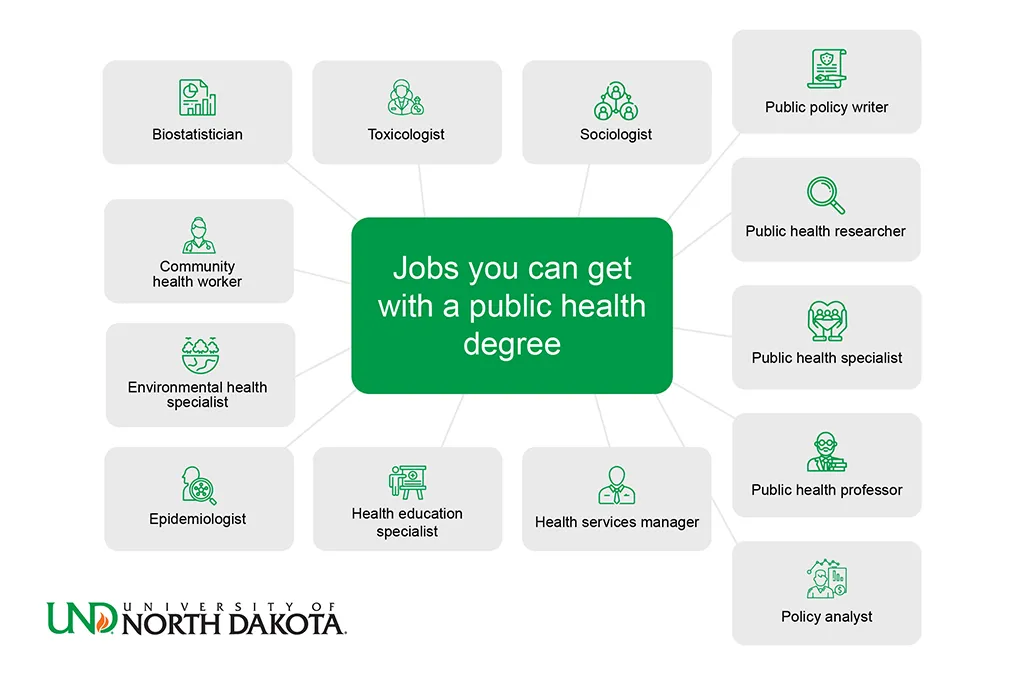
What Can You Do With a Public Health Degree?
With a public health degree, you can pursue a wide range of careers, from becoming an epidemiologist tracking disease outbreaks to a policy analyst shaping health legislation or a health educator empowering communities with knowledge.
Request Information
Public health goes beyond reacting to health crises. It's about prevention and creating sustainable systems for the future. As the public health expert Charles-Edward Amory Winslow succinctly put it, it's "the science and art of preventing disease" through organized efforts. This broad mission allows public health professionals to be involved in everything from environmental health to infectious disease control and healthcare management.
So, when you ask, what can you do with a public health degree, the answer is simple: nearly anything that involves making the world a healthier, safer place.
13 Jobs You Can Get With a Public Health Degree
There are many exciting jobs with a public health degree. Some positions may only require an undergraduate degree, while others might call for advanced degrees such as a master's or even a doctorate. Regardless of the role, all these jobs benefit from the core principles and skills gained through public health studies.

Biostatistician
What if we could find the answer to solving the next global health crisis through numbers? That's what biostatisticians aim for. They use math to find patterns in data related to public health, which could save lives. Far from just crunching numbers, these professionals analyze data to predict disease outbreaks, evaluate treatments, and guide healthcare decisions.
By applying advanced statistical models to biological data, biostatisticians find answers to questions like, "Which treatments work best?" or "What factors contribute to disease outbreaks?"
Their role is fundamental in designing clinical trials, analyzing health surveys, and identifying trends that inform public policy. Without biostatisticians, so many of the medical and health breakthroughs we take for granted wouldn't be possible.
A Master's in Public Health (MPH) is often a prerequisite to entering this field. UND's MPH program includes courses on biostatistics, thus equipping you with the skills needed for such a role. The university also values practical experiences, as evidenced by the organization of events such as the Datathon, where students team up to work with public health datasets by applying big-data analytical techniques.
Community Health Worker
Community health workers (CHWs) stand at the frontlines of public health. These professionals provide much-needed support to individuals who might otherwise struggle to access healthcare. They link healthcare providers and various communities, offering education, advocacy, and resources with the intention of improving health outcomes.
Most CHW positions require a bachelor's degree in a healthcare-related field, such as public health, to ensure they have the knowledge and skills to address the community needs. UND's Bachelor of Science in Public Health Education, for example, is designed to prepare future CHWs with a strong foundation in public health principles and applied learning through internships, service-learning projects, and public health study abroad opportunities.
However, some positions with federal agencies or public health organizations may also require a master's or doctoral degree for more advanced roles.
Environmental Health Specialist
There are roles that help prevent disease, but not by treating people, as is the standard way, but by focusing on controlling their environment. Environmental health specialists (EHS) fulfill this role as they help monitor and manage health risks related to air quality, water safety, food sanitation, and waste management, among other factors.
These professionals help reduce the spread of diseases, protect vulnerable populations, and ensure public safety by keeping pollutants, toxins, and other hazards under control. Their work is invaluable in creating healthier environments that support overall well-being.
To become an environmental health specialist, a bachelor's degree in environmental health, public health, or a related scientific field such as biology is often required. Programs like the Bachelor of Science in Public Health Education at UND cover key areas like environmental health, epidemiology, and public health policy—all necessary for such a career.
Epidemiologist
When a new disease emerges, epidemiologists jump into action. They track its spread and try to identify its causes. They also guide public health responses by gathering and analyzing data to understand how illnesses move through populations.
They could study chronic diseases, infectious outbreaks, or environmental health hazards. In all cases, their work is crucial in preventing the next health crisis. Their findings influence decisions on everything from vaccination campaigns to quarantines, making them indispensable in the fight against global health threats.
Madison Wahlen, a UND graduate, found her passion for epidemiology through hands-on experiences during her studies. After transferring to UND, she was able to intern at the Mayo Clinic, researching epidemiology and helping write a lymphoma research abstract.
"Public health is very much focused on serving people, and I think I feel ready to do that," Wahlen said. Her work at Mayo and the support she received at UND fueled her pursuit of a career in epidemiology, where she hopes to balance both individual patient care and broader public health impacts.
Health Education Specialist
Health education specialists function as the heart of community wellness—they provide the information that encourages people to make healthier choices. These professionals develop and implement programs to teach the public about nutrition, disease prevention, and healthy lifestyles. They can often be found working in schools, hospitals, or public health agencies.
These specialists raise awareness of major health issues like diabetes prevention, smoking cessation, and sexual health. By connecting individuals to the resources they need, they help reduce health disparities as well as promote long-term health improvements.
A bachelor's degree in public health or a related field is the minimum requirement for this role. Earning a Public Health certificate can also significantly boost your qualifications.
Health Services Manager
Behind every well-run healthcare system, you'll find a skilled health services manager. These professionals work tirelessly to make sure that hospitals, clinics, and healthcare organizations operate efficiently and effectively. They oversee everything: staff management, budgeting, patient care policies, and more.
A bachelor's degree is the standard starting point, but many positions, especially at larger institutions, may require an MPH or a degree in healthcare administration. For those aiming for leadership, UND's accelerated Public Health degree or a Public Health certificate could offer a fast track to understanding public health frameworks and management strategies, among other things.
Policy Analyst
What if you could influence policies that improve healthcare access or control pollution? Policy analysts do just that by researching, analyzing, and advocating for laws and policies that affect public health.
They help shape the future of healthcare by using data and research in order to influence decisions made at the local, state, and federal levels. Their work ensures that health laws and policies are informed by the latest research and public health needs.
For those pursuing law-focused undergraduate degrees, a minor in Public Health can provide a strong foundation in policy analysis. Additionally, UND's JD/MPH dual degree is particularly valuable for aspiring policy analysts who want to combine legal and public health expertise.
Public Health Professor
Public health professors mentor the next generation of health professionals and conduct important research that influences public health policy and practice. They typically work in universities, often conducting research on emerging health trends while educating students on topics ranging from epidemiology to global health.
Professors also publish studies and collaborate with international health organizations, making them equally as influential in both academia and practice.
To pursue this career, a doctoral degree is usually required, though teaching roles at some institutions may accept a master's in public health along with substantial field experience. UND's public health program offers pathways that can lead to academic roles, particularly through its Master of Public Health and advanced research opportunities.
Public Health Researcher
Public health researchers focus on using data to come up with insights about health, disease, and prevention. They design studies, analyze trends, and publish findings that help shape future public health strategies.
Whether they're researching the impacts of pollution on health or evaluating new treatment protocols, their work helps drive the evidence-based practices that keep populations healthy. Their discoveries inform everything from clinical guidelines to public health interventions.
A master's in public health is often the minimum requirement, while some researchers pursue a doctorate to lead major studies.
Public Health Specialist
Public health specialists are the go-to experts in various public health issues. From disease prevention and health promotion to environmental safety and regulatory compliance, their knowledge runs deep in numerous areas of community health.
A bachelor's degree in public health is typically the first step, but many employers prefer candidates with an MPH. These specialists are among the many roles that help implement public health initiatives, thus, making sure that communities stay safe, healthy, and informed.

Public Policy Writer
Public policy writers are the communicators behind public health legislation. They are the ones who translate even the most complex health data and research into clear, actionable policy proposals that decision-makers can implement.
Their work is absolutely necessary in ensuring that public health insights are reflected in laws and policies that aim to improve community health. These writers are primarily concerned with making sure that the voices of public health researchers and analysts are heard by those who have the power to make changes.
UND's JD/MPH dual degree is particularly suited for those looking to influence health policy through writing and advocacy, as public policy writers often work closely with lawmakers, advocacy groups, and healthcare organizations.
Sociologist
Sociologists in public health study how social factors (culture, economics, and environment) can affect health outcomes. They find answers to questions such as why certain populations are more vulnerable to diseases or why some health interventions succeed while others fail. This way, they provide crucial insights that help lead to more equitable health policies.
The work of sociologists in the sphere of public health is key to understanding the broader context of health disparities and creating effective public health interventions.
A bachelor's degree can lead to entry-level roles, but a master's and certifications are often required and valued for more specialized research or policy positions.
Toxicologist
Some substances can be incredibly harmful to human health. Therefore, toxicologists assess their impact with the aim of preventing public health disasters. They evaluate the safety of new drugs, analyze environmental hazards, provide the data needed to regulate potentially harmful substances, and much more.
Toxicologists also help protect the public from long-term exposure to toxins in the air, water, and soil. They play a huge role in ensuring that public health remains a top priority in industries ranging from pharmaceuticals to agriculture.
A bachelor's degree in public health, biology, or chemistry is typically the minimal requirement. However, for advanced roles, a master's or doctoral degree may be necessary.
Key Skills You Get With a Public Health Degree
A public health degree provides graduates with a very broad range of skills that are necessary for the roles discussed thus far. Through such a degree, you can acquire abilities such as:
- Analyzing quantitative and qualitative data using statistical methods and specialized software.
- Applying epidemiological techniques to assess public health situations.
- Designing, implementing, and evaluating public health programs and interventions.
- Understanding and developing policies that promote health equity and address structural inequalities.
- Leading and managing public health organizations and projects effectively.
- Communicating health-related content in a way that is clear and relevant to diverse audiences.
- Collaborating with professionals across various fields to achieve comprehensive public health goals.
- Applying strategies to identify and solve complex public health issues.
- Incorporating cultural awareness to ensure that public health initiatives are inclusive and effective for diverse populations.
Conclusion
Pursuing a public health degree represents a commitment to making an impact on communities, improving health systems, and addressing global challenges. With such a degree, you can choose between a range of job opportunities.
At UND, specifically, you'll gain the knowledge and skills needed to fulfill the duties of any of the roles we explored. As UND alumni Alison Traynor said, "UND has helped me tremendously to feel more prepared to work both with crisis situations but also with administration, with policy, with the legislature." So, if you're looking to turn your passion for health into a meaningful career, UND's public health program could be the perfect fit. Your future in public health is as wide as the impact you want to make.
FAQs
The Government and Public Administration sector is projected to grow by 4.5% over the decade, offering steady opportunities for MPA graduates.
Generally, higher degrees like an MPA improve your chances of earning higher salaries and securing more advanced leadership roles, as they equip you with specialized skills and qualifications.